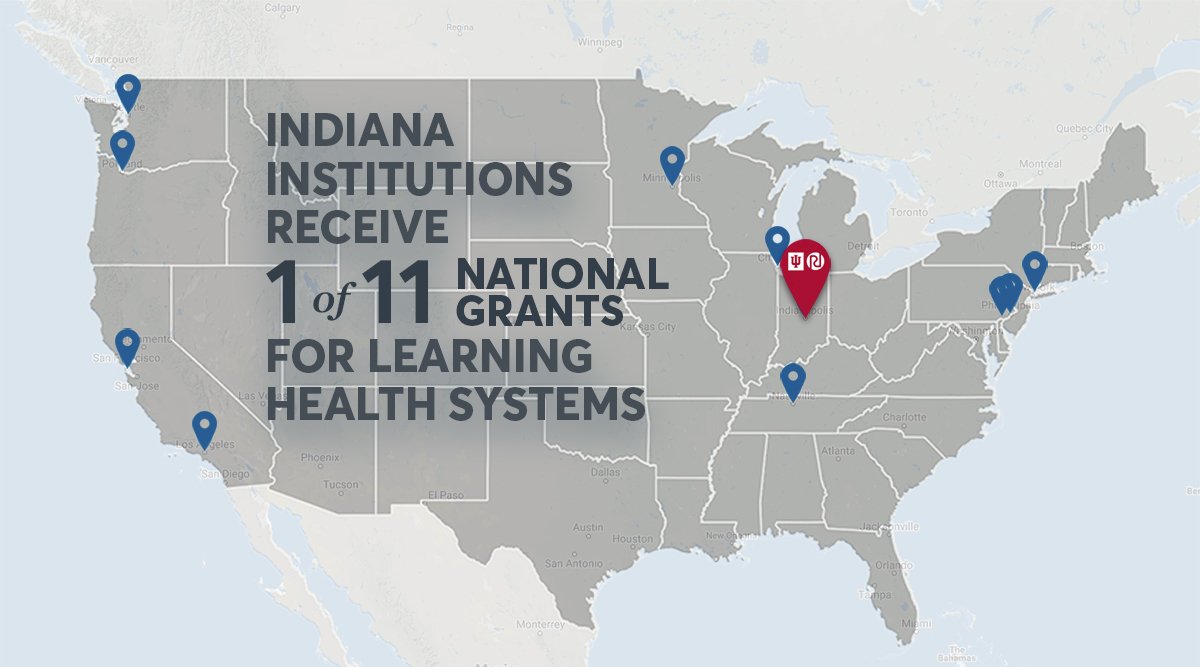A partnership between Indiana University School of Medicine and the Regenstrief Institute is one of 11 U.S. recipients selected to train researchers to conduct patient-centered outcomes research within learning health systems.
The selection of the IU School of Medicine-Regenstrief partnership to receive $3.4 million was announced by the Agency for Healthcare Research and Quality (AHRQ) and the Patient-Centered Outcomes Research Institute (PCORI). The 11 awards in nine states total $40 million over five years.
In addition to IU School of Medicine and Regenstrief, Indiana University Health is a key project collaborator.
“In recent years, IU School of Medicine, Regenstrief and IU Health have made great strides in expanding and conducting patient-centered outcomes research,” said Aaron Carroll, M.D., associate dean for research mentoring at IU School of Medicine, a Regenstrief Institute affiliated scientist and co-principal investigator. “Integrating that work into the learning health system, making it a part of daily care, brings its own set of challenges. This award will allow us to train researchers to overcome those hurdles to improve the quality of care patients receive in Indiana and beyond.”
Peter Embi, M.D., president and CEO, Regenstrief Institute, Inc., and co-principal investigator, said, “Every patient-care encounter is an opportunity to learn and improve the way we care for others. As health care becomes increasingly data-driven and a source of real-world evidence for improving care and quality, it is critical that we train experts who can create, study and sustain learning health systems. We are excited to work with our academic and health care partners as we launch this innovative program, and to be part of the first group supported to train the health system researchers of the future.”
Learning health system researchers strive to create health care systems that actually learn from every patient encounter, generating evidence to better care for individual patients and whole populations today, tomorrow and in the future.
Clinicians can call upon huge amounts of data contained in electronic medical records systems for information on individuals and populations and to help support patient care decision-making as well as research. It is this interoperability (through data standards) and connectivity of electronic medical systems that make learning health systems attainable.
The ultimate objective is to improve health and safety, thereby reducing illness and costly hospitalizations.
Organizations that apply learning health system principles aim to improve patient care and health system operations through the systematic generation, adoption and application of evidence. Clinicians and health system leaders work together to ensure that evidence is updated, disseminated to clinical teams and communicated to patients in ways that support shared decision making. Learning health systems are essential as the health care landscape becomes increasingly characterized by rich sources of information that are available in digital formats, programs and applications.
The 11 new Learning Health Systems Centers of Excellence funded under this initiative will produce the next generation of learning health services researchers to conduct patient-centered outcomes research and implement the results to improve quality of care and patient outcomes. Newly trained clinician and research scientists will work within health systems by collaborating with systems’ leaders and conducting studies to address how health care organizations can improve patient outcomes.
AHRQ is the lead federal agency charged with improving the safety and quality of America’s health care system. AHRQ develops the knowledge, tools, and data needed to improve the health care system and help Americans, health care professionals, and policymakers make informed health decisions.
The Patient-Centered Outcomes Research Institute (PCORI) is an independent nonprofit organization authorized by Congress in 2010. Its mission is to fund research that will provide patients, their caregivers and clinicians with the evidence-based information they need to make better-informed healthcare decisions. PCORI is committed to continuously seeking input from a broad range of stakeholders to guide its work.
Full List of National Grant Recipients
The grant recipients are:
- Leveraging Infrastructure to Train Investigators in Patient Centered Outcomes Research in the Learning Health System (LITI- PCORLHS), Indiana University School of Medicine-Regenstrief Institute, Indianapolis, Ind.
- A Chicago Center of Excellence in Learning Health Systems Research Training (ACCELERAT), Northwestern University, Chicago, Ill.
- CATALyST: Consortium for Applied Training to Advance the Learning Health System with Scholars/Trainees, Kaiser Permanente Washington Health Research Institute, Seattle, Wash.
- Learning Health Systems Mentored Career Development Program, University of Pennsylvania, Philadelphia, Pa.
- Learning Health System Scholar Program at Vanderbilt, Vanderbilt University, Nashville, Tenn.
- Leveraging Infrastructure to Train Investigators in Patient-Centered Outcomes Research in the Minnesota Learning Health System Mentored Career Development Program (MN-LHS), University of Minnesota, Minneapolis, Minn.
- NW Center of Excellence & K12 in Patient Centered Learning Health Systems Science, Oregon Health and Science University, Portland, Ore.
- PEDSnet Scholars: A Training Program for Pediatric Learning Health System Researchers, Children’s Hospital of Philadelphia, Philadelphia, Pa.
- Stakeholder-Partnered Implementation Research and Innovation Translation (SPIRIT) program, University of California- Los Angeles, Los Angeles, Calif.
- The Center of Excellence in Promoting LHS Operations and Research at Einstein/Montefiore (EXPLORE), Albert Einstein College of Medicine, Bronx, N.Y.
- University of California-San Francisco Learning Health System K12 Career Development Program, University of California- San Francisco, San Francisco, Calif.










